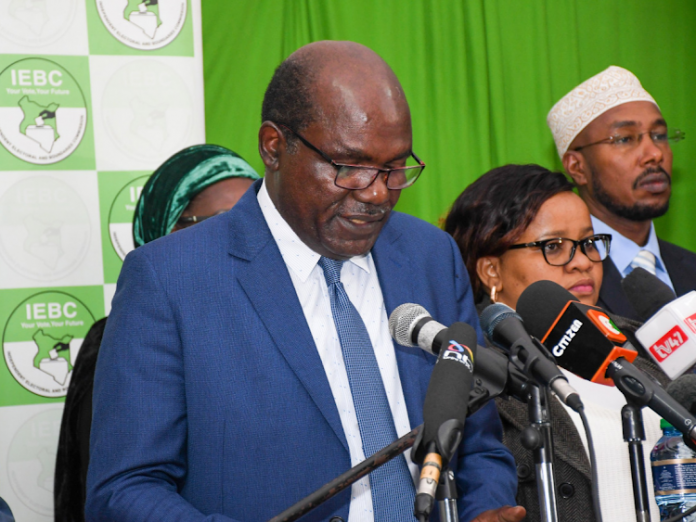As a response to electoral fraud discovered in the 2017 elections, a collection of civil society organizations has filed a petition contesting IEBC Chairman Wafula Chebukati’s decision to forbid use of hardcopy voter registrations in the general election on August 9.
The Communications Authority of Kenya (CA) is named as an interested party in the case, along with Chebukati, IEBC, and Attorney General Paul Kihara Kariuki, who are designated as respondents.
The administrative regulation from Chebukati that forbids the use of manual voter registers at the 46,232 polling places is at the heart of the petition.
“As a result of the 2017 post-election evaluation, most of the malpractices were as a result of the physical voter registers. We believe that using the digital registers will cut down these malpractices where a presiding officer has knowledge of who has not voted, their ID numbers and is therefore able to input their details in the KIEMs kits, allowing malpractices to happen,” said Chebukati.
The petitioners claim that Chebukati’s judgment violated Section 44A of the Elections Act, which deals with the demand for a second form of voter identity.
A simple, accurate, verifiable, secure, accountable, and transparent process is required by the legislation.
According to the petitioners, widespread technological failures, as those saw in the general elections of 2013 and 2017, could prevent voters from exercising their democratic rights by preventing digital voter identification using integrated elections management system devices.
In order to prevent electoral fraud, the IEBC insisted on using electronic methods of voter identification during a news briefing on the voter list for 2022.
“According to me, this electronic identification will be the best way of preventing someone winning when they are not supposed to be wining in the first place,” said IEBC CEO Hussein Marjan.
“Some of the illegal transfers we are talking about, the ones that were reversed, they will not vote but if we were not talking about this, in areas where these transfers have occurred, you will see 90 to 100% voter turnout.”
The petitioners believe that Chebukati’s administrative action breaches Article 83(3) of the Constitution, which compels IEBC to make sure any decision made must not deny qualified voters their day at the polls, despite the commission’s defense of a fair election process.
If the gadgets installed in all of the polling places fail in large numbers to electronically identify voters, Chebukati’s mandate, claim the petitioners, may result in the postponement of the general election scheduled for August 9.
IEBC disagrees with the petitioners’ claim that manual voters registers are a safer alternative to digital registers.
“The register that is appearing in the KIEMS kit, when a voter comes and is identified, that record is archived, you can’t come again and be identified to vote again. In physical register, it depends on the level of collusion, one can strike out several times a voter who has already voted,” added Marjan.
In the run up to the 2017 general election, a three-judge Court of Appeal bench upheld a High Court decision ruling that it was not possible for IEBC to conduct an exclusively electronic exercise due to the possibility of systems failure and the consequences of such a technological challenge.
The system’s susceptibility to hackers, election officials’ technical incompetence or power outages that could lead to data loss among considerations made by High Court Judges Kanyi Kimondo, Alfred Mabeya and Hedwig Ong’udi in arriving at their verdict dated July 21, 2017.
The commission plans to reach out to stakeholders to resolve the complementary voter register dispute.
“Perhaps a date can be set for this conversation before we print the ballot papers so that we can have a further engagement on this,” stated Chebukati.



















